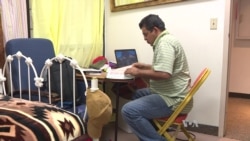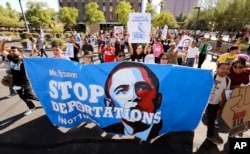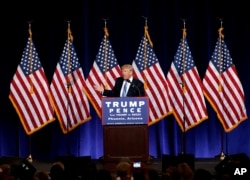Ishmael Delgado waits at the edge of the desert he crossed 26 years ago.
"I hope for an answer soon. Amen," he said, touching words inked into a yellow strip of fabric. The cloth with Ishmael's prayer flutters in the breeze along with the prayers of other parishioners at Shadow Rock Church in the mountains above Phoenix, Arizona. Together they make up the church's garden prayer flag.
But others who wrote prayers for the flag can leave the church — Delgado cannot. He is one of a handful of undocumented immigrants across the nation who has sought sanctuary from deportation in a church.
Although no law lays out rules, a 2011 memo from U.S. Immigration and Customs Enforcement (ICE) provides guidance for enforcement actions on church grounds and other sensitive locations such as hospitals and schools. On its website, ICE writes that enforcement actions in those places "require either prior approval from an appropriate supervisory official or exigent circumstances necessitating immediate action."
Delgado paid for the presumed safety of Shadow Rock Church with the life he left behind. He says it was like living the American dream — a wife and children, a nice home and a good car. Now he sleeps on a bed in the church's basement.
He came here almost two years ago, when Barack Obama was still president, to seek refuge from deportation after his arrest during a traffic stop.
"I came alone with my clothes, and the first day too much things passing in my head," he said in English, a language he has worked to improve since arriving decades ago. When Delgado came to Shadow Rock Church, he laid out his case to the Reverend Ken Heintzelman and other members. It's an experience he still recalls with wonder.
"Pastor Ken — at the beginning, I saw him. I saw his eyes. He wants to help me," Delgado said. "He says, 'The doors of Shadow Rock are open for you' — oh, my God."
'Foreign invaders'
An estimated 325,000 undocumented immigrants live in Arizona, according to a 2016 Pew Research study, making the state's largest city a flashpoint for the nation's contentious immigration debate. The City Council recently rejected a proposal to become a sanctuary city on a 7-2 vote.
Protests supporting Guadalupe Garcia de Rayos, an undocumented immigrant who was arrested when she went in for a routine check with ICE, garnered national attention.
"President [Donald] Trump is standing up for the rule of law, and illegal immigrants are not guests. They're criminals; they're breaking the law. They're not innocent," said Nohl Rosen, a private citizen standing outside the Phoenix ICE office where de Rayos was detained.
Holding an American flag and a sign thanking Trump for enforcing immigration law, Rosen said he felt compelled to offer a counterpoint to the immigration activists' protests shown on television.
"Look at the Constitution; they'd be considered foreign invaders," he said. "You're crossing here illegally. What are you doing? You're invading the country."
In a written response, the Phoenix Police Department told VOA, "We are not aware of any such locations actively being used as sanctuary locations within the city of Phoenix."
Shadow Rock's Heintzelman says church members anticipated a bigger response from the activist community, as well as more requests from undocumented immigrants, when they began offering sanctuary in 2014.
But Heintzelman says it is only in the days since Trump was inaugurated that interest in church sanctuary has increased in the Phoenix area.
"We did feel that offering sanctuary under this administration would be different, but the conclusion we came to was that we offered sanctuary because of our values of dignity and inclusion and justice and keeping families together," Heintzelman said.
The Church World Service estimates around 800 churches offer sanctuary in the United States, a number it says has doubled since the election of Trump, whose executive orders cut off federal funding for so-called sanctuary cities. Trump's orders also expanded immigration enforcement, which focused on deporting criminal aliens under the Obama administration.
The modern sanctuary movement began in the 1980s when church leaders sheltered Central American refugees fleeing conflict, but the concept is as old as Christianity.
Delgado worries the Trump administration won't respect these unwritten rules.
Waiting for resolution
A second undocumented immigrant — Sixto Paz — has shared the basement living space on and off with Delgado for the last nine months.
Both men continue to fight their cases through the nation's complicated, lumbering immigration system. Sanctuary has given them new perspectives.
"Right now, I don't say bad words. I don't need alcohol to live. I don't smoke. I don't need it," Delgado said. Within church walls, he spends his time cooking, reading the Bible, getting visits from his family and talking with Paz about Trump's latest moves on immigration.
"I feel like my son, my little son is my power," said Paz, as he fought back tears. "This is something that can give me more strong to stay and fight." He fills his days practicing the trade he left behind, working on the church roof.
The mountainous terrain of Delgado's and Paz's world make television and internet access difficult, often delaying news by one day. When they do get word of Trump's latest executive orders, the shock is immediate.
"Wow, wow, oh, my God. Maybe it's time to go home," Delgado said, struggling to understand the latest directives. "Oh, my God, he is taking too much. Too many executive actions he is signing."
In case new Trump administration orders change the guidance for sensitive locations, both men keep backpacks filled with clothes, toiletries and their Mexican passports close by, so they can run back into the desert, if needed.
Delgado holds up a backpack. "We going outside, and we have to do whatever we got to do."
For now, his future remains unclear and his prayer unanswered.







